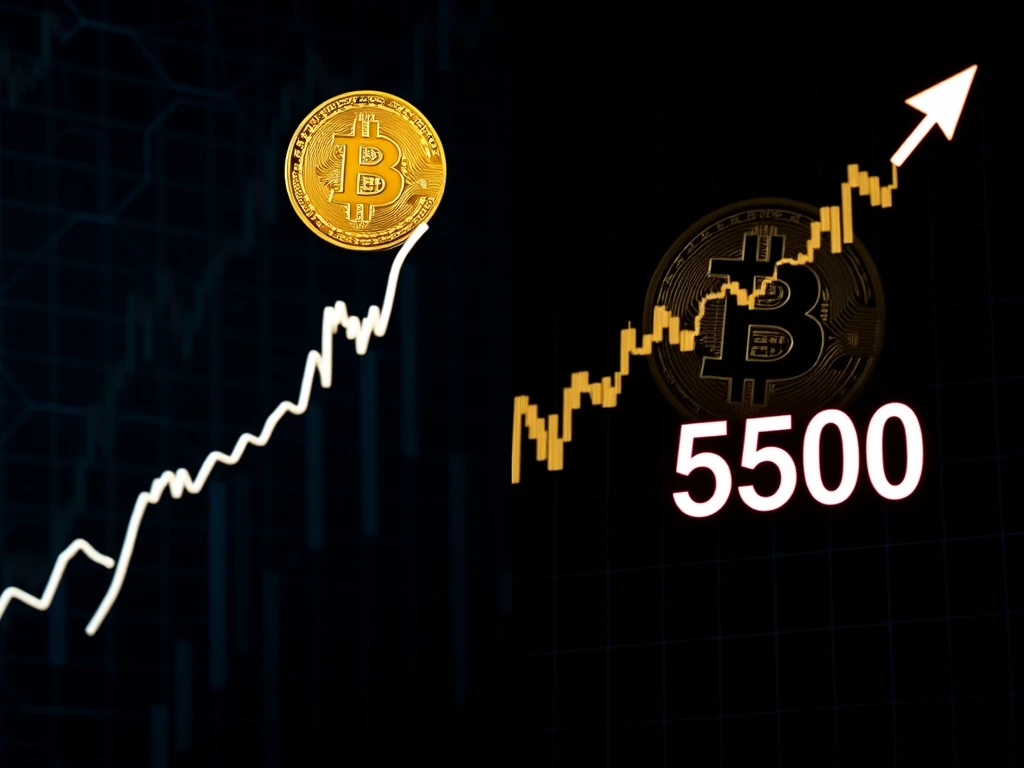Bitcoin’s Amazing Rally: Is the Crypto Market Still Tied to Stocks?

Recent market movements have reignited a long-standing debate in the digital asset world: the crypto market’s relationship with traditional finance. Specifically, the recent rally in Bitcoin has been mirrored by gains in the S&P 500, leading many to question if the dream of crypto ‘decoupling’ from stocks is truly over. For a while, traders hoped digital assets would forge their own path, independent of Wall Street’s ups and downs. However, the past few weeks suggest otherwise, with intraday price action looking remarkably similar between the two asset classes.
The Return of Correlation: Bitcoin and S&P 500 Movements
The idea of cryptocurrency decoupling stems from the desire for digital assets to be seen as an independent asset class, potentially offering a hedge against traditional market volatility or economic downturns. A true decoupling would validate this view. However, recent data shows a strong short-term correlation. Over the last 10 days, the price movements of Bitcoin and major altcoins have closely tracked those of the S&P 500. This synchronized movement challenges the decoupling narrative, prompting market participants to ponder the conditions necessary for a genuine separation.
Why Are Stocks Showing Strength?
Despite facing headwinds like persistent US trade disputes with Canada and Mexico, and new tariffs affecting various economic regions, the Stock Market has shown notable resilience. The S&P 500, after peaking in February, has struggled to reclaim certain levels but has held strong above key support. Factors contributing to this strength include:
- **Trade Concessions:** Reports of quiet trade negotiations and mutual tariff waivers between the US and China suggest a gradual de-escalation, easing some market pressure.
- **Robust Corporate Earnings:** Strong first-quarter earnings reports from major companies like Microsoft and Meta have boosted investor confidence. These results alleviate concerns about an AI bubble and demonstrate companies’ ability to adapt to trade challenges, sometimes by relocating production or expanding domestic operations.
These positive developments in the traditional Stock Market environment create a more favorable backdrop for risk assets like cryptocurrencies.
The Federal Reserve’s Role in Market Liquidity
Market attention has shifted from weaker economic indicators, such as the recent decline in US PMI manufacturing data, towards the Federal Reserve‘s potential policy shifts. After a period of balance sheet reduction, the Fed is reportedly considering asset purchases. This could inject liquidity into the financial system. Increased liquidity is generally seen as positive for risk-oriented assets, including those in the Crypto Market. Therefore, even if a full decoupling isn’t happening, cryptocurrencies could still benefit from a more supportive macroeconomic stance driven by the Federal Reserve.
Is Decoupling Dead? Short vs. Long-Term Trends
While the short-term correlation between cryptocurrencies and the S&P 500 is evident, looking at longer timeframes presents a different picture. Since March, the total Crypto Market capitalization has risen by 8.5%, while the S&P 500 has seen a decline of 5.3%. Over a six-month period, the divergence is even more pronounced: the total crypto market cap is up 29%, compared to a 2% drop for the S&P 500. This indicates that while short-term movements might track closely, the overall performance trends over several months can differ significantly. The idea of Decoupling may not be entirely dead, but it’s certainly not the dominant force in day-to-day trading right now.
It’s too early to definitively call a bottom for the S&P 500 or declare the trade war fully resolved. An economic recession would likely impact both markets negatively. However, the current strength in equities suggests reduced investor risk aversion. For now, the elevated correlation might represent the most favorable scenario for the Crypto Market, benefiting from positive sentiment flowing from traditional finance and potential liquidity injections from the Federal Reserve.
Summary
The recent rally in both the Bitcoin and S&P 500 markets challenges the long-discussed crypto ‘decoupling’ narrative. Influenced by factors like easing trade tensions, strong corporate earnings, and the Federal Reserve‘s potential liquidity plans, the Stock Market is showing resilience, which appears to be benefiting the Crypto Market in the short term. While longer-term trends still show divergence in performance, the current correlation highlights the increasing interconnectedness of these markets. For now, crypto traders may find themselves watching traditional finance cues more closely than they’d prefer.








